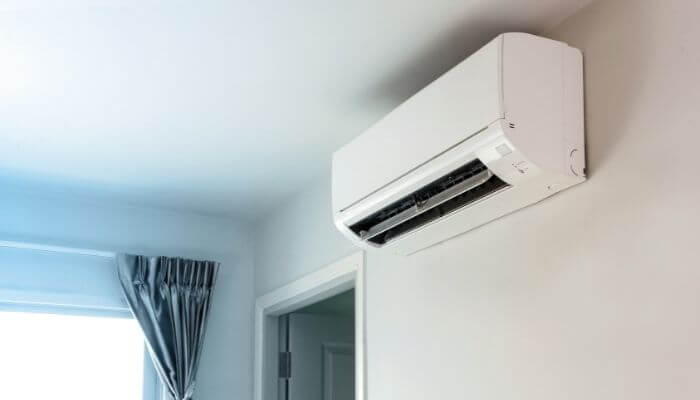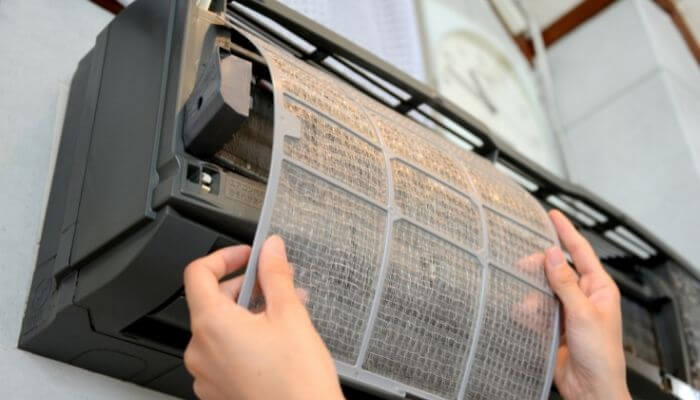For people struggling with noisy A.C units, some quick solutions include fitting a purpose-made sound blanket over it or covering the frame with sound dampening foam.
You can also opt for readjusting the air conditioning unit or merely acquiring a better quality A.C.
it is also worth tightening loose screws, wiping the fan blades clean, and checking for damage to the compressor or condenser.
We understand how distracting a noisy air conditioner can be, especially if you work from home or perform everyday tasks which demand silence.

Moreover, it could lead to sleepless nights after a long day’s work and even disturb your children during their study sessions.
Rather than hiring an HVAC technician and spending hundreds of dollars, here are six techniques that will help reduce annoying air conditioner noise:
1. Create A Sound Barrier Between You & The A.C Unit
Placing a soundproof room divider between you and the air conditioning system can reduce the volume of A.C noise.
Be aware that you should maintain a minimum distance of 3 feet between the barrier and the A.C unit to ensure that it can still work properly.
This distance guarantees sufficient space for consistent airflow to efficiently circulate within the gap.
2. Fit A Sound Blanket Over The A.C Unit
A soundproof blanket, also known as a sound barrier curtain, is basically a large covering designed to dampen sound waves by letting the core material of the blanket absorb them.
You can buy purpose-made A.C blankets which do not affect the unit’s airflow. In fact, they insulate the compressor and allow the unit’s internal structure to maintain a constant temperature.
This increases the durability of the compressor’s bearings and allows a staggering 30-50% reduction in noise.
There are a few you could choose however the SBLHD Air Conditioner Compressor Sound Blanket promises noise reduction of at least 5 decibels.
3. Use Sound Dampening Foam
Frequently it’s the materials surrounding your air conditioning unit that produce more noise than the unit itself.
For example, a nearby cupboard or windowpane may vibrate owing to the pressure generated by the unit, and this can lead to rattling sounds.
Applying sound dampening foam on hard frames can help. This will significantly reduce the vibrations, especially if you use 2 to 3 layers of acoustic foam.
4. Upgrade Your A.C
If you’ve tried a number of different methods but have had no success then upgrading your A.C unit is a good idea. This could either mean replacing parts like the compressor or fan blades or purchasing an entirely new premium unit.

Generally, an air conditioner needs approximately 20 BTU for every square foot it requires to cool. But if you’re looking to invest in an A.C with considerably lower noise production, opt for a unit with a rating of 25 to 30 BTUs.
Also, if it’s viable, choose a small-sized portable air conditioners and window units since their dB ratings are relatively lower than that of larger units. Remember, anything around 55 dB will produce noise equivalent to a buzzing fridge.
Did You Know: A.C units with a decibel rating below 50 are called whisper-quiet units – even when they function at their maximum cooling capacity.
5. Relocate The A.C
Avoid installing your A.C in the vicinity of narrow halls or passageways as this can amplify noise production due to the sound reverberating off the walls.
Relocate the unit so that it is at least 3 feet, preferably more, away from any wall to avoid unnecessary reverberation exacerbating the sound problems.
Relocating your A.C to a more unrestricted space can do wonders for noise reduction.
6. Use White Noise
White noise is created by merging sounds from the full spectrum of sound frequencies. This collective combination of every frequency allows white noise to mask any additional sounds in the background.
White noise, therefore, works as a “blanket of sound” that prevents any disturbance from sudden sounds that fluctuate in intensity.
There are many benefits of white noise, one if that A.C noise effectively fades into the background becoming unnoticeable.
As an Amazon Associate I may earn a small fee from qualifying purchases at no extra cost to you. This helps us run the site, so thanks for your support!
